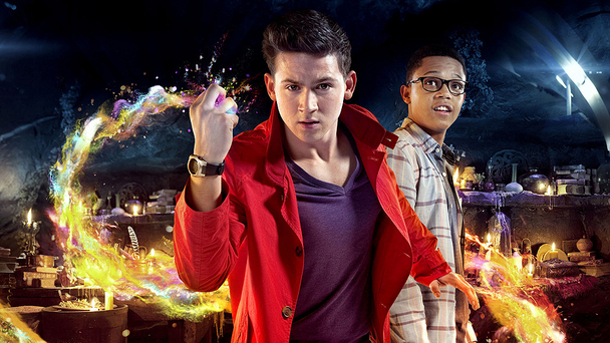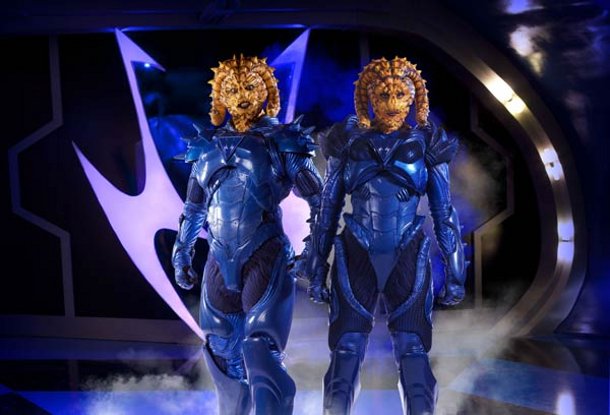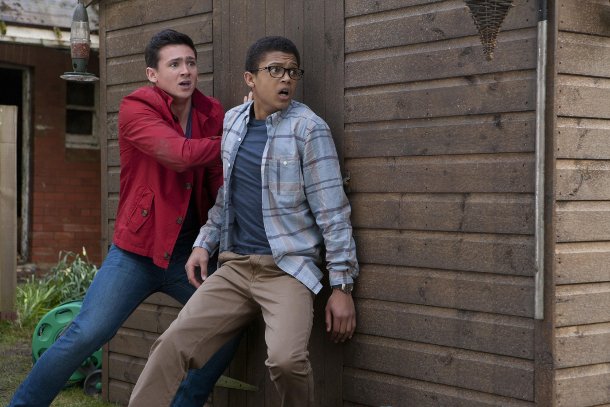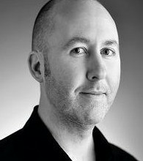Russell T Davies Talks Wizards Vs Aliens
RTD talks exclusively to SFX about his new CBBC show
Magic goes mano a mano with cold, hard science in new CBBC show Wizards Vs Aliens . In an exclusive interview, co-creator Russell T Davies tells SFX about the pressure of following The Sarah Jane Adventures , the rules of enchantment, the ongoing battle for quality kids TV - and reveals who he would have cast as the Rani in Doctor Who ...

Was Wizards And Aliens always intended as a direct replacement for Sarah Jane Adventures ?
It was. Initially we all thought Sarah Jane would come back one day. We knew Lis was ill, but we thought she’d get better – how sad was that. And so we literally cooked this up because we had a gap in production, and we thought “Well, we’re supposed to be making six episodes of Sarah Jane this year and we can’t - that’s got to be delayed until next year, so let’s make six episodes anyway. Let’s make a new show, and then if that’s successful we can make both series at once.” So we were nicely ambitious. It was really weird – me and Phil Ford said “Let’s go to dinner and cook up a new show.” Now that never works. I literally went off to this dinner thinking “Well, you can’t do it like this – you don’t just go to dinner and invent a new show and get it made.” I’ve got this romantic notion about creativity – you’re meant to be hit by a thunderbolt, you should be in the bath and going “Eureka!” You don’t sit there over the starters going “Let’s invent something new.” But for the one and only time in my life, we did! We both came to the table with kind of rubbish ideas. He was there going “There’s a robot, who’s on the run,” and I said “There’s a witch, who’s keeping a secret…” - really rubbish. We were sitting there going “What a load of nonsense!” So we chucked them away and I thought “We’ll just have dinner, that’s a good night for me.”
And as fanboys, as science fiction fans and fantasy fans, we sat there having a really interesting conversation about which [genre] we wanted to do – Sarah Jane was science fiction, so maybe now we should do supernatural. Maybe we should do witches or werewolves or spells or demons. Phil likes that sort of stuff but I was sat there going “Do you know, I actually love spaceships and rockets and laserbeams and things like that…” We genuinely had a proper conversation about it. “Isn’t it funny you can only write one or the other?” All those years of Doctor Who and you can never have a spell being cast, and all those years on Buffy and no one ever walks in with a laserbeam… actually they probably would in Buffy , they wouldn’t blink. With something like Harry Potter you don’t get a robot arriving. I wish we had it on record as to who said what first, but I seem to remember saying “Well, actually that’s a good idea for a show!” And then, I must admit, Phil opened his mouth and got to it before I did, and said “ Aliens Vs Wizards !” And I went “Oh my god – that’s it!” And it then became Wizards Vs Aliens , we swapped it around. And in that moment, I’m not kidding you, you could see the entire show.
And you can sort of see that’s never been done. I know there’s obviously a trend now for cowboys vs aliens and dinosaurs vs aliens and things like that, but actually they are just culture clashes, because cowboys and aliens can, quite feasibly, exist in the same world, whereas wizards and aliens don’t exist in the same world. It’s bigger than a culture clash – it’s a genre clash, and the mileage we get out of that will give us fuel for ten years. This thing could run for ten years. It’s lovely. The arguments they have on screen about it – we’ve got Tom who’s a wizard and Benny who’s the scientist, and in mid-adventure they pause to argue whether an apparating spell is the same as a matter transporter – what’s the difference between them? They’re the same thing, but why can you work out the rules to one and not work out the rules to the other? I just love that. I can remember looking at Phil and going “Oh my god, that’s it, we’ve so got it.” And here we are. I was skipping home, because I honestly thought that night we'd fail.

Was there huge pressure to follow a success like Sarah Jane ?
At that stage we didn’t know Sarah Jane was going to fall through completely. I’m having a laugh when I’m describing that night but actually it’s a lot of work for a lot of people. There’s a big gap in the BBC Wales schedule, a big gap in BBC Wales funding if shows like this fell through. If there had suddenly been a gap and it had disappeared script editors, designers, producers, carpenters, electricians would all have been out of work. So there was a genuine pressure on us to say “We need to come up with the goods now, and we need to deliver,” and then we needed to look for something that’s going to run. The good thing that happened then, which kind of pissed us off at the time, but actually was brilliant, was when it became clear that we needed a completely new show, and this was sitting there, CBBC didn’t just turn around to us and say “Yes, thank you, we’ll have that.” They were actually quite marvelously snotty. They sort of said “Just because you made Sarah Jane doesn’t mean you get to make the replacement.” And actually that’s quite right, that’s kind of within the BBC charter – no one has a right to make a show. The money has to go to whoever’s got the best idea, and whoever the commissioner wants to commission.
Get sneak previews, exclusive competitions and details of special events each month!
So they loved Sarah Jane , they backed it with all their heart, but they did not say “This is a guaranteed commission.” They kind of made us pitch, and we went through months of development – and that was the godsend. It didn’t really piss me off because I knew how good an idea it was, to be honest. Half of me was thinking “If it doesn’t get made here, I’ll take it somewhere else, thanks…” But we genuinely worked on it. What you see in episode one is like the fifteenth draft. I always do a lot of drafts on scripts but 15 is quite unusual. We really worked it. There were different versions – Tom had a sister at one point. We looked at future stories to see whether the sister was going to work, whether she was worth paying for. And we axed the sister in the end. We worked on the spells and the rules of the magic and how the Nekross work, in real detail, because it’s not just a one-off adventure where Tom meets the Nekross in one story, it’s got to sustain itself for years. The rules of engagement and stuff like the fact the wizards have only got three spells a day, that came in only halfway through the development. Before that they were quite free and easy with their spells, and you could see the budget going up! It’s part of the problem with spells – why don’t they just go “Disappear!” click their fingers and the aliens have disappeared.
And it took us a long time to realise that we were free of the Doctor Who universe as well. We’d all been working in that for years, almost a decade. I remember the meeting where we came up with the three spells rule. I remember we said “Well, let’s say that spells are born at sunrise. You get three spells a day, and this is magical, there’s no science behind this at all. With sunrise you get three spells.” And that then becomes a marvelous part of the plot. There are various stages where you see them at dawn, filling up with spells, and that’s a really good moment. I think kids love rules like that, they really get into that kind of thing. So we had this surprisingly fierce development process over a good six months, and then we went to CBBC and pitched properly – we had to go in, with our documents, with our scripts. It was like The Apprentice !
Did you see the Chuckle Brothers waiting outside, preparing to pitch?
Certainly! They said "While you’re here, could you write us a few more scripts, please?" We sat there practicing… I haven’t done that for years! We had speeches, we had figures, we had co-funding and all that sort of stuff. It was a really, really tough process, and actually it’s given us quite a cast-iron show. I came out the end of that going “That is exactly how you should commission a show.” I really respect that process.
More on the next page, including who RTD would have cast as the Rani...
How does it feel not having that readybuilt framework of the Doctor Who universe to fall back on? Scary? Or liberating?
Oh, it’s liberating, actually. We didn’t realise that until we started. You kind of think of Doctor Who as limitless, and it is. You can have stories set anywhere, doing anything, but actually there are certain ways it behaves, and we realised we’d been under that yoke for quite a long time. We’re not reinventing the wheel – it’s still an adventure, there are monsters, there are aliens, there’s good and bad, and an even simpler good and bad than you have in Doctor Who , because you can have six year olds watching this, it’s a young kids’ show. But within that is the great liberation of saying “We can decide the sun has powers.” It’s like suddenly being in Superman’s universe. I was sitting there going “They don’t have a problem with Superman - they say he gets his power off the sun.” In the Doctor Who world you’d say “This creature specifically has powers from a sun,” but you’d have to explain it, whereas in a new show you can kind of accept it as natural. I tell you what’s interesting – we’re planning series two now, there are 14 episodes of series two, and we worked very, very hard doing a time travel story, simply because we wanted to go back to the 16 th Century and have witchfinders. You’ve got wizards, how brilliant to have a Witchfinder General story. We worked very, very hard on this and we abandoned it. We had great treatments, great ideas, and in the end we looked at it and just went “This is Doctor Who , or Sarah Jane .” If they’re travelling back in time suddenly we all found ourselves conforming to not changing established history. No matter how it’s done, the travel between two different times, everything was just reverting back to a Sarah Jane Adventure . And so we ditched it. Gareth Roberts did about two months’ work on that and it’s gone. I just had to take a deep breath in the end and say “This will be a good story, but I can’t honestly say it’s a Wizards Vs Aliens story.” So it was junked. That’s how tough you have to be sometimes. On the second series we’re still discovering this.
Did any ideas for a future series of Sarah Jane find their way into this show?
In series two there’s one story that was abandoned for Sarah Jane . Phil had written a full script called "The Thirteenth Floor" that’s literally the best thing he’s ever written, and we’d be mad to let that die, so we’re going to try and make that into a series two story. It’ll be completely rewritten, completely different characters, completely different aspects, but it’s so brilliant we’ve got to give it a go.
The clash between science and sorcery is obviously at the heart of the show. Does that inform every creative decision?
Yeah, that’s really interesting. What we had to do was really quite unexpected in that you had to be very strict about the line between the two, in terms of colour, in terms of style and stuff like that. Initially, we didn’t realise that. In the development of scripts, things were a little more blurred. There’s a character called Randall Moon, who’s a hobgoblin, and in the very first drafts when this hobgoblin appeared he was kind of like a Buffy hobgoblin in that he was slightly modern. I remember he had a fridge – he’d take sandwiches out of the fridge, and his dialogue had that modern twang to it, postmodern even, that slight awareness of being in a genre piece that’s a very sort of Buffy / Angel tradition. But it wasn’t working. Because then you cut to a spaceship with aliens who sometimes talk in a similar sort of voice. They can be kind of arch and kind of reflective, so actually we have to put wide blue sea between both genres. So the magic has to be very, very magical. The hobgoblin has to speak like a real old fashioned hobgoblin, so he talks in thees and thous… it’s very funny speech, but it’s much more elaborate speech, and the aliens then are much crisper. What I did with the aliens was take out a lot of the humour. They had a lot of gags and stuff like that, and again that’s very relaxed, that’s a little bit Doctor Who . We can laugh at the Slitheen and stuff like that. We relax as we go along but in the first few episodes at least the Nekross are much tougher and there are very few gags. They can’t be flip - that kind of flip, modern, easy dialogue that infects everything. It’s all of television, actually. It’s a very aware voice, very aware of being in a drama. So we had to eradicate that because we had to separate the genres. And literally in terms of colours the Nekross are very blue and very yellow, and magic’s got earthier colours. Magic’s much more red and green, much more colourful full stop, much richer and more charming to look at. There’s a coldness to the Nekross. So yes, it’s very important to cut to a scene and to know if you’re in a magical chamber or if you’re in a science fiction spaceship. It’s keeping that genre clash throughout the whole thing, all the time.
Is that ongoing clash a hard thing to pull off?
It’s not, actually. Once you just take that deep breath and say you can’t explain magic, then you’re kind of free. It is the reason we had to impose the three spells a day limit. The biggest problem, actually, was how powerful magic is. The Nekross can develop a laser, they can destroy a city, but you kind of keep it believable. I believe those things. Whereas with the wizards you say “Can’t they just click their fingers and then everything’s fine again?” So we had that development time to hammer down the rules, to make sure the stories work. We’re already talking about series three and four. We had a story meeting for series two – you kind of think right, this’ll be a nightmare, it’ll be really hard work, but we came out after three hours with every single story in place - apart from that time travel story we’ve now got rid of, but we had spares up our sleeve, because it’s so rich. Do you want a science fiction story? Do you want a magic story? Do you want one that’s both? And the clash is just like an engine, right at the heart of the show. Three hours and we had all our stories in place. Long way to go, turning all of those into scripts, but it was brilliant. That was very exciting. We just thought “This is definitely going to work.”

There's no Sarah Jane figure, so casting the two young leads must have been crucial…
It was hard, yes.
What qualities were you looking for?
Simply good actors and nice men as well. I must stop calling them boys because they’re of an adult age. It’s hard – I’ve done young shows before, I cut my teeth on stuff like Children’s Ward , and to be a young lead actor is a really tough thing, because you’re kind of like the leader of the company as well, and frankly you just want to go out drinking! So you’ve got to get people who are really responsible and really hardworking. And we got them. It was a miracle. We auditioned endlessly – everyone always says that but you do. If you can put all of us making young dramas into a room we would all hug each other and weep at the casting process, because we’re all after the same people. If you are one of those people you will never be out of work. You end up chasing the same names. Scott kind of came out of the blue – we’d almost gone with someone else and then he appeared. We auditioned him about five times in the end, but after one audition we just went “Oh my god that’s him, that’s brilliant.” Thank god for Roath Lock studios because he’d just done Upstairs Downstairs – he had about 20 lines in an episode of Upstairs Downstairs as a young boxer, really nice. And everyone said “Oh, he’s a nice lad as well.” You get that report back saying he’s not going to go mad and not turn up and be late and stuff like that.
And then Percy as Benny we’d actually auditioned way back, when we did some preliminary auditions as part of our development - sometimes you do preliminary auditions to show the commissioners tapes of what it’ll look like, what it’ll sound like. And he cropped up then, way before anybody else, and we didn’t exactly cast him then but we pencilled him then and said “We’ll never get a better Benny than that, let’s keep our eye on him.” You can’t book somebody too far in advance but you literally pencil them and say “If they’re going to be offered a job in EastEnders or whatever, let us know, because we like him and we probably want to work with him.” And then we put them together and they were brilliant together, and that was magic. Just lucky. And they’re diligent, hard working… I’d get texts off Annette Badland, who adores them, saying "You’ve chosen a couple of leaders there, they’re so good on set." So hooray – luck of the draw! Next time I hope to be reporting from a drug den, where I am pulling the cast out of the gutter. That’s much more fun for me, frankly, but it didn’t happen this time!
You’ve cast Annette in this, who you used as Margaret Slitheen in Doctor Who . Would you be looking to cast anyone else you’ve used on Doctor Who ? Or does that begin to blur things?
It does. A lot of times names would crop up and I would say “At least for series one let’s just keep a distance.” Ruthie Henshall crops up as a villain and she is so brilliant. And actually it’s funny, she’d always been on my list of Doctor Who villains. If I’d brought back the Rani it would have been Ruthie Henshall , because she is just glorious – she’s showbiz and she’s got that West End flair to her but she’s a properly good actor. She knows genre. She’s someone who comes in and just delivers a villain that’s absolutely the right pitch immediately. She’s done so many different genres herself. She pitches it perfectly. I’d always wanted to work with her. She’s not a Doctor Who actor, but in my mind she was always there - we could just never get dates to fit for her on Doctor Who . But in she came and she’s glorious, so funny as an evil billionaire who discovers that magic exists… and then she discovers that aliens exist! And she’s going to rule the world with that. Fantastic villain.
Do you feel like you’re fighting a rearguard action for quality British children's telly?
It’s hard, that one. It’s a very easy thing to say. As far as I’m concerned, people have been worried about the death of children’s television and fighting for standards in children’s television ever since I started working in children’s television, and that was in 1987! That’s a hell of a long time ago. It always needs safeguarding, it always needs fighting for. There is a genuine battle to be fought. But there are genuinely people fighting that battle. There are always good and creative people who step forward, ready to fight that fight. I have been through two generations. There is less children’s television than there was, but the standard is still very high. And I’m including American stuff in that. I don’t like slagging off American stuff like it’s rubbish - the scripts of some of those animations are brilliant. You and I are never going to love those Sweet Life or It’s So Raven half-hour sitcoms, but they deliver perfectly good scripts, with perfect little morals or happy endings, telling kids to do the right thing with a few good gags. They deliver very well on what they do. It’s very easy to say those shows are rubbish but they’re not, actually. I also think that you can do better than those shows. There’s always someone ringing a bell saying it’s the end of the world, and it hasn’t quite happened yet. But it’s always worth keeping an eye on.
Nick Setchfield
Wizards Vs Aliens launches on CBBC 29 October

Nick Setchfield is the Editor-at-Large for SFX Magazine, writing features, reviews, interviews, and more for the monthly issues. However, he is also a freelance journalist and author with Titan Books. His original novels are called The War in the Dark, and The Spider Dance. He's also written a book on James Bond called Mission Statements.


